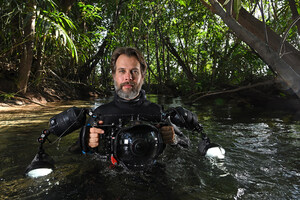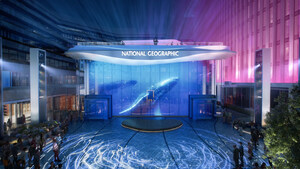National Geographic Society Board of Trustees Endorsed More Than $4 Million in Grants
Fifty-six percent of awardees from outside United States; Representing 34 countries, including Ecuador, Italy, the Philippines and Rwanda
WASHINGTON, Dec. 8, 2017 /PRNewswire-USNewswire/ -- The National Geographic Society Board of Trustees this week endorsed more than $4 million in grant funding, further strengthening the Society's investment in the best in science, exploration, conservation, storytelling, education and technology. The 111 grants will help address the most critical issues facing our planet and ensure a healthier, more sustainable future for generations to come. With the completion of the annual grants cycle, the Society awarded more than 600 grants in 2017, totaling nearly $12 million.
"This week's decision by the National Geographic Society leadership demonstrates a historic and continued commitment to understanding the world and all that's in it," said Gary E. Knell, president and chief executive officer of the National Geographic Society. "The significance of Society funding cannot be overstated. We're making substantial investments to support all those striving to achieve a planet in balance."
For the first time, applicants comprised a wider range of disciplines, including educators, technologists and storytellers as well as the scientists, conservationists and explorers traditionally supported by the organization. In addition, many applicants responded to requests for proposals (RFPs) tied to the Society's three areas of focus: The Human Journey, Wildlife and Wild Places and Our Changing Planet. The RFP topics ranged from long-distance animal migrations to changing polar systems and big cats conservation.
Applications approved at the December meeting included grants that will employ citizen science to collect data about widespread mangrove die-off in the Caribbean; test innovations to combat illegal sea turtle egg trafficking, coastline degradation and poaching; and build and test long-range, private wireless networks to strengthen the capacity of rangers and managers in protected areas from Malaysia, Burkina Faso, Niger and Benin.
"Our grant recipients are — and have always been — the heart and soul of what we do," said Jonathan Baillie, chief scientist and senior vice president, Science and Exploration at the National Geographic Society. "When we award a grant, we're not just funding a project. We are also inviting bold individuals from a variety of fields to join a passionate community of like-minded global leaders."
The Society's Committee for Research and Exploration reviewed and recommended the grants for funding. Fifty-six percent of approved grant recipients hail from outside of the United States and represent 34 countries, including Argentina, Ecuador, Italy, Indonesia, the Philippines and Rwanda.
For nearly 130 years, the National Geographic Society has been pushing boundaries to explore and document our world, supporting more than 13,000 grant projects along the way. From Hiram Bingham's exploration of Machu Picchu to Jane Goodall's chimpanzee behavioral research and, more recently, the discovery a new species of human ancestor in South Africa, the Society has long been committed to investing in bold people and transformative ideas and sharing these stories with the world.
Individuals interested in applying for a grant are encouraged to visit nationalgeographic.org/grants or email [email protected] to learn more. The deadline for the next round of grants applications is January 3, 2018.
Grant Recipients of Note:
Amado Blanco
Empowering Communities to Replenish the Ocean
Net-Works' innovative business model is a simple and scalable way of tackling poverty in marginalized coastal communities while replenishing the fish stocks on which 3.35 million fishers in Southeast Asia depend for their livelihoods. Through Net-Works, manufacturers can source valuable raw materials, such as high-design carpet tiles made from marine debris, at a premium price if they adhere to verifiable environmental standards. They plan to build a social marketing campaign that will spread knowledge around marine biodiversity and the need for conservation resulting in changed behaviors and bigger and better Marine Protected Areas. Ultimately, they aim to replicate this approach to 500 communities by 2022 — protecting 1 billion square meters of the ocean and engaging 10 million people.
Jess Cramp
Evaluating the effectiveness of marine reserves on highly migratory sharks
Commercial fisheries have caused major declines of numerous shark species. Marine sanctuaries that provide refuge from commercial fishing have potential to conserve sharks. However, long-distance migrations make it difficult to assess the effectiveness of sanctuaries since individuals are likely to move between multiple national jurisdictions. This project will evaluate the effectiveness of the 2 million-square-kilometer Cook Islands Shark Sanctuary in reducing mortality of pelagic sharks by undertaking a biophysical assessment of two threatened shark species — oceanic whitetip and silky — and provide important baseline data on their presence, abundance, habitat use and movement patterns. Researchers will work alongside local fishers and stakeholder groups to gather data and encourage participation in the research. Collected data will be used to propose amendments that could strengthen conservation and management of sharks.
William Saturno
Recovering Creation: Saving the Lost Walls of the San Bartolo Murals
The epic story of creation, expertly rendered on the fragile plaster walls at the site of San Bartolo, Guatemala, remains one of the single most important artifacts ever discovered from the ancient Maya. The standing walls, excavated, documented and conserved between 2001 and 2010, depict Maya gods taming the primordial world, organizing it and readying it for the emergence of humanity and its governance under the divinely sanctioned office of the K'uhul Ajaw (Holy Lord). As remarkable as they are, these standing walls represent less than 40 percent of the complete paintings, the rest of which were recovered as more than 7,000 intentionally dispersed and deposited fragments. This project takes a multipronged approach to reassembling these lost walls revealing the missing chapters of the epic Maya narrative and addressing the factors that threaten the preservation of the San Bartolo murals.
Kimberly Williams-Guillen
The InvestEGGator: A New Technology to Track Wildlife Trade of Sea Turtle Eggs
Poaching of wildlife is a major threat to the survival of endangered species across the world, particularly affecting large, slow-to-reproduce vertebrates such as sea turtles. In Latin America, sea turtle eggs are prized as a delicacy and aphrodisiac. While poachers themselves are impoverished locals, eggs make their way to local consolidators and then to middlemen trafficking toward regional and international markets. Documenting trade routes would provide information allowing for disruption of the trade in wildlife products. To accomplish this challenging task, Dr. Guillen has developed the "InvestEGGator," an artificial sea turtle egg containing a GPS tracker that transmits locations using cellular networks. The 3-D printed eggs are planted in nests vulnerable to poaching and then used to follow movements from nesting beach to final market. This phase of the project will conduct a larger scale field trial of the InvestEGGator by deploying 100 eggs in Nicaragua and Costa Rica. The information collected will result in a better understanding of locations of consolidation points, transit routes, and trafficking patterns in two countries with different laws regarding turtle egg collection.
About the National Geographic Society
The National Geographic Society is a leading nonprofit that invests in bold people and transformative ideas in the fields of exploration, scientific research, storytelling and education. Through our grants and programs, we aspire to create a community of change, advancing key insights about our planet and probing some of the most pressing scientific questions of our time while ensuring that the next generation is armed with geographic knowledge and global understanding. Our goal is measurable impact: furthering exploration and educating people around the world to inspire solutions for the greater good. For more information, visit www.nationalgeographic.org.
SOURCE National Geographic Society
Related Links
WANT YOUR COMPANY'S NEWS FEATURED ON PRNEWSWIRE.COM?
Newsrooms &
Influencers
Digital Media
Outlets
Journalists
Opted In





Share this article